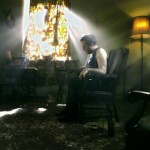 Re-issues and re-unions… A sign of ageing? A desperate attempt to re-visit past glories and re-ignite a fading creative spark? Commercial enterprise fuelled by lazy nostalgia? The news of British Sea Power’s reissues of their self-proclaimed ‘classic’ debut The Decline of British Sea Power was always an ambiguous proposition. On the one hand, for many fans and journalists this was their finest album, a 24-carat BSP diamond. On the other, the idea of seeing them play this curious mind-mangling beast in full felt somewhat contrived and lacking in the essential vigour and shambolic unpredictability characteristic of this band.
Re-issues and re-unions… A sign of ageing? A desperate attempt to re-visit past glories and re-ignite a fading creative spark? Commercial enterprise fuelled by lazy nostalgia? The news of British Sea Power’s reissues of their self-proclaimed ‘classic’ debut The Decline of British Sea Power was always an ambiguous proposition. On the one hand, for many fans and journalists this was their finest album, a 24-carat BSP diamond. On the other, the idea of seeing them play this curious mind-mangling beast in full felt somewhat contrived and lacking in the essential vigour and shambolic unpredictability characteristic of this band.
The fact that the band were going on stage in the company of their erstwhile keyboard terrorist and marching drum menace Eamon also felt alarmingly nostalgic and lacking in that strange imagination we’ve come to associate with BSP. Yet, in BSP we trust and on an unusually sunny Thursday night in Manchester we suspended the doubts to surrender our eyes and ears to the purveyors of ‘high-church amplified rock music’.
The night’s support act was Japanese London-based acid-punk, psychedelic noise merchants Bo Ningen. An act familiar to all BSP faithful from their previous Sea Powering appearances. Shrieking vocals, flowing robes, wild hair drenched in reverb and erratic moves – everything about this collective made them a perfect antidote to the safety of the mainstream and a fitting opening act for the sonic cornucopia served up by the headliner.
The darkening of the stage draped in customary tree branches and decorated with bird ornaments signalled the imminent arrival of the night’s heroes. Anticipation reaching it’s climax as the lights descended from above to the menacing, disturbing pulse of ‘Apologies To Insect Life’ – possibly the finest reinvention to Dostoevsky’s classic Crime and Punishment. The predatory darkness punctuated by frontman Scott’s animalistic sexual yelps filled with terror juxtaposed against the arrival of a manically-grinning Eamon, who almost immediately proceeded to dive into the excited crowd whilst attempting to drum with a relentless determination of a man possessed by pagan spirits.
 Without pausing for breath, the band erupted into the paranoid derangement of ‘Favours in the Beetroot Fields’ (surely, the best song titles EVER!) and the bewilderingly beautiful malice of ‘Something Wicked’. Then came the big guns. Inevitably, ‘Remember Me’ and ‘Fear of Drowning’ got a huge reaction and turned into defiant sing-a-longs. ‘The Lonely’ sounded as fresh, poetic and odd as it did all those years ago. “Just like Liberace/I will return to haunt you with/peculiar piano riff” is a line so odd, so ludicrous, so romantic … so essentially BSP. Back in position on stage, Eamon was joined by the band’s more recent recruit, viola player Abi Fry, whose voice and instrument gave the sound poignant serenity.
Without pausing for breath, the band erupted into the paranoid derangement of ‘Favours in the Beetroot Fields’ (surely, the best song titles EVER!) and the bewilderingly beautiful malice of ‘Something Wicked’. Then came the big guns. Inevitably, ‘Remember Me’ and ‘Fear of Drowning’ got a huge reaction and turned into defiant sing-a-longs. ‘The Lonely’ sounded as fresh, poetic and odd as it did all those years ago. “Just like Liberace/I will return to haunt you with/peculiar piano riff” is a line so odd, so ludicrous, so romantic … so essentially BSP. Back in position on stage, Eamon was joined by the band’s more recent recruit, viola player Abi Fry, whose voice and instrument gave the sound poignant serenity.
A crowd favourite, ‘Carrion’, performed by the band at most of their live outings, was given a more measured and less frenetic rendition, without losing its anthemic, Sturm und Drang poeticism. Its lyrics – echoed by the crowd – so brilliantly enigmatic, haunting and wild: “Carry on inside of your heart/ Under the brine you won’t notice the dark/Can stone and steel and horses heels ever explain the way you feel.” Not many songs make you want to jump off cliffs and scream at the top of your lungs. Then again, not many bands can get away with playing a song that lasts for over 13 minutes either. Waxing and waning, ‘Lately’, a conceptual rock epic, assumed a greater significance in the full album setting. But instead of the predictable move of finishing the set with the last album track ‘Wooden Horse’, Sea Power launched into the abyss of ‘Rock in A’ culminating in the rarely played mental assault of Julian Cope’s ‘Out of my Mind on Dope and Speed’ and Eamon’s bear-wrestling antics.
Then again, not many bands can get away with playing a song that lasts for over 13 minutes either. Waxing and waning, ‘Lately’, a conceptual rock epic, assumed a greater significance in the full album setting. But instead of the predictable move of finishing the set with the last album track ‘Wooden Horse’, Sea Power launched into the abyss of ‘Rock in A’ culminating in the rarely played mental assault of Julian Cope’s ‘Out of my Mind on Dope and Speed’ and Eamon’s bear-wrestling antics.
After a short break they returned for the second set. Scott dressed in a peculiar garment that can only be described either as a nightie or a hospital gown, bare foot and elated. Blasting through the later years of their back catalogue, the second instalment of this retrospective excursion brought us the heartbreakingly beautiful ‘The Great Skua’. The words ‘sweeping’ and ‘cinematic’ can barely do justice to this zenith of BSP’s elegiac powers gliding along the sound waves of euphoria. And then, finally, the last track from The Decline of… and one of the band’s earliest songs, ‘The Wooden Horse’ was a fittingly mysterious ending bringing it all full circle.
After all these years, unlike many of their noughties contemporaries, BSP didn’t sound dated or tired. They may not have sold as many records as The Strokes or The Libertines but their brand of quixotic rock has always been flavoured by something more intelligent and genuinely odd. Their wild unpredictability never felt premeditated. Lurking beneath the indie rock exterior, there was always something of Werner Herzog’s ‘ecstatic truth’ that can only manifest itself and can’t be reached through stylisation or analysis. ‘Too clever for their own good’ could perhaps be an apt description of their predicament. In an age of UKIP nationalism, tight-fisted mean-spirited austerity BSP’s flamboyant intellectualism infused with pre-hipster arcane ephemera and echoes of English romanticism is more urgent and more vital than it’s ever been. This is a band that carved out its own space transcending neat genre terms and convenient labels, a solitary beacon of defiance and beauty, a call to action in the music world littered with pastiche, cliches and homogeneous sounds.
The album cover of The Decline of… bears a mysterious inscription: ‘We ourselves may only be loved only for a brief time…Even so, that will suffice…There is a land for the living and the land for the dead…’ In the case of British Sea Power, we are definitely not in the presence of a ‘dead’ heritage band drifting into semi-retirement. Each twist and turn of BSP’s history has been 100% unpredictable. Over the years they’ve ventured into a multitude of musical styles, made forays into cinema soundtracks and, most recently, toured with brass bands. What lies ahead? Who knows? No doubt they will once again surprise us all.
Photo credits: Michael Bond and Graham Coburn
The Decline of British Sea Power reissues are available from Golden Chariot Records now.




